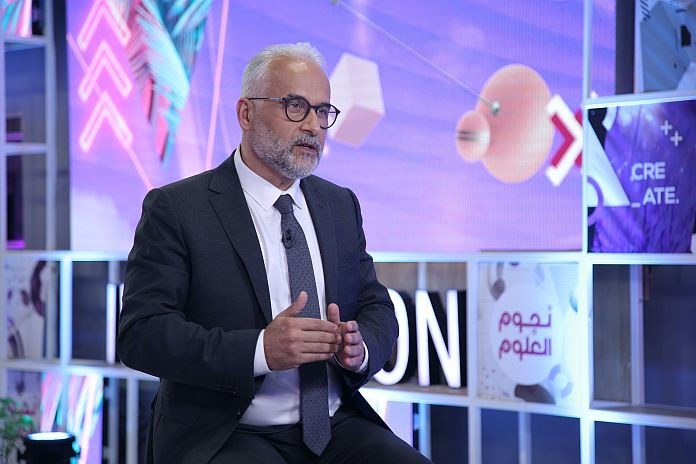Doha, Qatar – The COVID-19 pandemic has fast-tracked a digital revolution across the world, specifically in the Arab region – connecting people and providing them with access to a wealth of data, information, and media.
For this reason, society has had to embrace STEM education for sustainable development within the MENA region, according to Professor Fouad Mrad, the longest-serving jury member on Qatar Foundation’s (QF) edutainment TV show, Stars of Science.
“This stimulated access to knowledge leaves governments and parents no choice but to help facilitate access to STEM fields among the next generation, and introduce related policies to maximize the benefits to society,” he said.
Professor Fouad Mrad, a longtime advocate for STEM education and Frontier Technologies manager at the United Nations, highlights how the show has brought significant value to the Arab world, both through the projects it showcases and its efforts to foster a culture of entrepreneurship.
“STEM-based innovation offers the highest added value from novel ideas, especially with the local markets’ craving for solutions. Stars of Science introduced and demonstrated a ‘can do’ culture to Arab youth, showing them that they can cultivate their ideas in this region,” he explained.
Professor Mrad added that – given the struggles related to education, health, and unemployment – local communities must address these issues by focusing on STEM-based education and innovation initiatives that target the youth.
“A blend of educated youth skilled with STEM-enabled tools and solutions addressing these longstanding problems is a recipe for successful implementation of the sustainable development goals. Innovators could transform a novel STEM-based idea into a marketable product addressing identified needs, creating opportunities for the individual and jobs for others, with wealth for society and pride for the family.”
The Arab region boasts an exceptionally talented young population that Stars of Science is always looking to encourage, nurture, and help grow. This year, QF’s welcomes the return of Season 10’s winner, neurosurgeon alumnus, Associate Professor (PD) Dr Walid Albanna, as a jury member.
“For more than a decade, Stars of Science has demonstrated how we in the Arab region can encourage our young talent to pursue scientific excellence and invest in their ideas. The show made innovation and entrepreneurship fun and engaging, offering aspiring researchers, engineers, and inventors a space where their ideas are not bound by practical restrictions and I’m delighted to join the jury this season,” says Dr Albanna.
In 2018, Dr Albanna impressed the jury and audience with his invention, the Neurovascular Retina Analyzer – a portable robotic camera that scans the retina and supports monitoring of patients after a stroke. As a juror, Dr Albanna brings his unique perspective to the show and pushed this season’s top Arab innovators to realize their full potential.
Professor Mrad pointed out that Stars of Science’s impact on the Arab youth and their families is significant, highlighting that many innovators who have appeared on the show, like Dr Albanna, were young viewers who gathered the courage to apply.
“Many of them recall being motivated to prepare ideas for multiple years before applying to the show, ensuring that they take full advantage of the opportunity, prove their ingenuity, and change the lives of many,” he said.
Stars of Science falls under Qatar Foundation Research, Development and Innovation, the QF umbrella of STEM-focused institutions and programs, complementing this landscape with a significant reach throughout the region and beyond. The show, along with other significant initiatives such as the Qatar Academy for Science and Technology, Qatar Science & Technology Park, Qatar National Research Fund, and many others, all work to promote purposeful engagement in the fields of science, technology, engineering, and mathematics in Qatar and beyond.
“Through its multifaceted initiatives and programs, QF contributes tremendously to STEM education and engagement throughout the region, ranging from quality basic education to post-doctorate relevant research, from purposeful funding all the way to localized research and development,” said Professor Mrad.
Watch Season 13 starting from September 10, 2021, and running to October 22, 2021, on seven channels in the region and online, where Professor Mrad and Dr Albanna preside over a new crop of young Arab innovators. For a full broadcast guide to Stars of Science Season 13, visit. Apply to be on Stars of Science Season 14 to become the next innovator, visit www.starsofscience.info





